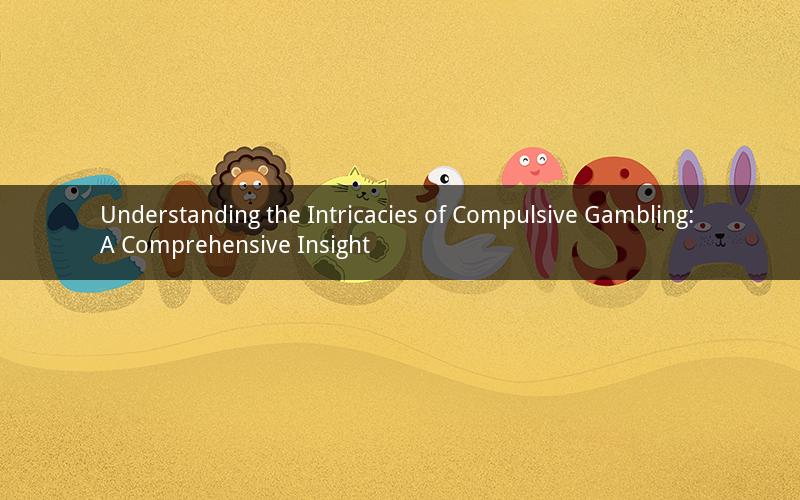
Compulsive gambling, often referred to as gambling addiction, is a complex issue that affects millions of individuals worldwide. It is characterized by an uncontrollable urge to gamble, despite the negative consequences it may have on an individual's life. This article delves into the definition, causes, symptoms, treatment options, and societal implications of compulsive gambling.
Definition of Compulsive Gambling
Compulsive gambling is defined as an addictive behavior where an individual cannot control their urge to gamble, despite experiencing negative outcomes such as financial, emotional, and social problems. This addiction is similar to other substance addictions, such as alcohol or drug addiction, as it involves a psychological and physical dependence on gambling activities.
Causes of Compulsive Gambling
The causes of compulsive gambling can vary from person to person, but several factors contribute to the development of this addiction. These include:
1. Genetic predisposition: Research suggests that there is a genetic component to compulsive gambling, with individuals having a higher risk of developing the addiction if a family member has a history of gambling problems.
2. Environmental factors: The availability of gambling opportunities, exposure to gambling advertisements, and social influences can increase the likelihood of developing a gambling addiction.
3. Psychological factors: Individuals with certain personality traits, such as impulsivity, low self-esteem, and a need for excitement, may be more susceptible to developing a gambling addiction.
Symptoms of Compulsive Gambling
Recognizing the symptoms of compulsive gambling is crucial for early detection and intervention. Some common symptoms include:
1. Inability to control gambling: A compulsive gambler may find it difficult to stop gambling, even when faced with negative consequences.
2. Preoccupation with gambling: The individual may constantly think about gambling, planning their next betting session, or reliving past gambling experiences.
3. Increased tolerance: A compulsive gambler may require larger amounts of money or more time spent gambling to achieve the same level of excitement.
4. Risky behavior: Compulsive gamblers may take on excessive financial risks, borrow money, or sell possessions to fund their gambling activities.
5. Emotional and social consequences: The addiction can lead to strained relationships, financial difficulties, and a decline in overall mental health.
Treatment Options for Compulsive Gambling
Treatment for compulsive gambling involves a combination of therapy, support groups, and lifestyle changes. Some common treatment options include:
1. Cognitive-behavioral therapy (CBT): CBT helps individuals identify and change negative thought patterns associated with gambling, develop coping strategies, and improve problem-solving skills.
2. Support groups: Joining a support group, such as Gamblers Anonymous, can provide individuals with a sense of community and understanding from others who share similar experiences.
3. Medication: In some cases, medication may be prescribed to help manage underlying mental health issues or cravings for gambling.
4. Financial counseling: A compulsive gambler may benefit from financial counseling to address their financial problems and develop a budget to manage their finances.
5. Relapse prevention: Learning how to cope with triggers and develop healthy coping mechanisms is essential for preventing relapse.
Societal Implications of Compulsive Gambling
Compulsive gambling has significant societal implications, including:
1. Economic burden: The addiction can lead to significant financial losses, both for the individual and society. This can result in increased debt, bankruptcy, and decreased tax revenues.
2. Health consequences: Compulsive gambling can lead to mental health issues, such as depression and anxiety, as well as physical health problems due to neglect.
3. Social consequences: The addiction can strain relationships with family and friends, leading to isolation and social withdrawal.
4. Crime: Some compulsive gamblers may turn to criminal activities, such as theft or fraud, to fund their gambling habits.
5. Mental health issues: Compulsive gambling can exacerbate existing mental health conditions or contribute to the development of new ones.
Frequently Asked Questions about Compulsive Gambling
1. What is the difference between problem gambling and compulsive gambling?
Problem gambling refers to a mild form of gambling addiction, while compulsive gambling is a severe form of the addiction with more significant negative consequences.
2. Can anyone develop a gambling addiction?
Yes, anyone can develop a gambling addiction, regardless of age, gender, or socioeconomic status.
3. How can I tell if I or someone I know has a gambling addiction?
Signs of a gambling addiction include an inability to control gambling, preoccupation with gambling, increased tolerance, risky behavior, and emotional and social consequences.
4. Is there a cure for compulsive gambling?
There is no cure for compulsive gambling, but with proper treatment and support, individuals can manage their addiction and reduce its negative impact on their lives.
5. Can compulsive gambling be prevented?
While there is no foolproof way to prevent compulsive gambling, individuals can reduce their risk by avoiding gambling opportunities, being aware of their risk factors, and seeking help if they develop gambling-related problems.